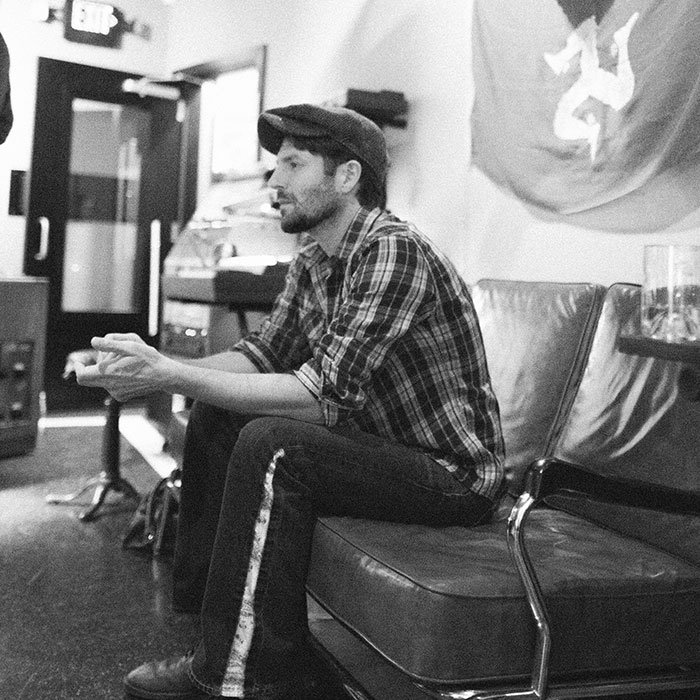Videos by American Songwriter
Don’t try to pigeonhole Ray LaMontagne. While critics have been quick to compare him to any number of rarefied and rootsy icons — the Band, Van Morrison, Tim Buckley and Steven Stills among them — LaMontagne sole muse is the inspiration that strikes from within. “I always let the songs lead the way,” the soft-spoken singer/songwriter insists. “It’s always kind of the same process. I hear all these melodies. If something catches me, then I say to myself, wow, I’ve really got to pursue this further.”
The dusty veneer this New England native established with his first four albums — Trouble (2004), Till the Sun Turns Black (2006) and Gossip in the Grain (2008), and the Grammy-winning God Willin’ & the Creek Don’t Rise (2010) — shifts slightly with the impending release of Supernova, which finds him connecting with producer Dan Auerbach and taking more of a psychedelic spin.
We recently connected with LaMontagne and in an exclusive interview, asked him to expound on his overall MO.
Supernova seems to be a bit of a departure from God Willin’ & The Creek Don’t Rise. Was that a conscious effort on your part?
It wasn’t really a conscious thing. It just has to be interesting for me. That’s all it is. I really don’t know anything about music or music theory or anything like that. When I hear a melody I pick up the guitar and I plunk around on it until I find the right chord or the major and minor, or whatever the hell it is. I was hearing stuff that was really speaking to me.
That hint of psychedelic suggestion seems like that’s something new for you.
I always liked that psychedelic sound. I was always a fan of early Pink Floyd. I like the Kinks, the Troggs. I loved all that stuff. Captain Beefheart too. So I think this album is maybe tipped a little more in that direction in terms of influences. Elvis Costello also played a big part in this record. He’s always been a sort of mentor to me. Overall, I was just going through this weird stage. Nothing was sounding interesting to me. I’d think, I don’t want to do that, or, I’ve done that already. It was like the well had run dry. So I put my heart on my sleeve, and I told Elvis, “God, I don’t know what the hell I’m doing. I feel like I’m banging my head against the wall.” And he said, “There’s only one way. You just have to trust that inner voice.” That was really helpful. So I just really allowed myself to write a different kind of song. I thought people might not like it, but that’s never been a factor for me. I’ve been writing songs now for fifteen years and so I can trust my gut at this point.
What was Dan Auerbach’s input?
I’ve wanted to work with Dan on some level for years now. This had been a long time coming but actually, it’s perfect timing. I sent him the demos and Dan put together a great band of really experienced musicians. The vibe in the studio was great, because it was like everybody had equal say. Everybody had input. Anybody who had any good ideas were welcome to throw those ideas out. Everyone was listened to. I think that’s how it’s supposed to be. That’s how a producer’s supposed to operate, to hear everybody out, and to hear everyone’s ideas. Very cool things can happen that way.
You’ve reaped all kinds of awards and gotten all kinds of praise from the critics. Does that create a high bar where now you feel that now you have to live up to all the accolades?
No, because I haven’t focused on the praise. I only focus on the negative stuff.
Why is that?
I don’t know Maybe because you can use the negatives, but you can’t use praise. When somebody says, that’s great, it doesn’t stick. When someone says, that sucks, it’s so boring… that sticks. That pisses me off. And then the scrapper in me comes out and I put that much more into it the next time.
So if you get panned, that becomes your motivation?
That’s changing as I’m getting older. I realized a couple of years ago that I can’t do that any more. I can’t use that negativity because it was kind of affecting me in a bad way. I was feeling really uncomfortable in a number of ways, not only mentally, but physically. So I think I’m kind of done with that. I’m enjoying the fact that I’m able to make a living doing what I do.
So how would you sum up your trajectory over all at this point?
When I had started I figured I’d be happy if I could just write some songs that people would want to play and record. I would have been really pleased with that. I was a songwriter first. I never thought of myself as a performer ever… ever… ever! That’s where I come from. The fact that people would want to come to my shows and see me sing songs, that was a surprise to me. So I just feel really lucky. I don’t write songs to please anybody. If they’re not interesting to me, I don’t write them. And then if I like them, I want to share them. That’s all you can do.














Leave a Reply
Only members can comment. Become a member. Already a member? Log in.